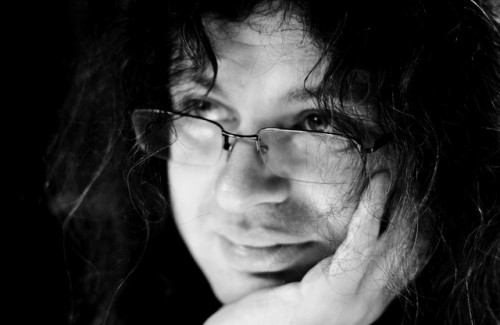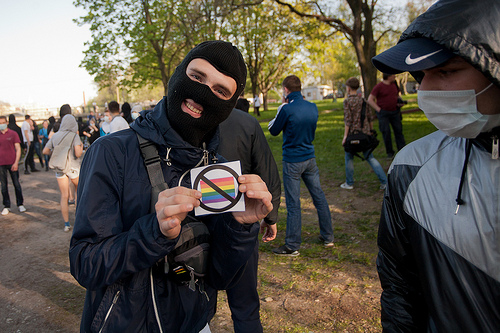Poet Dmitry Kuzmin on the Anti-Gay Government Campaign in Russia.
by Olivia Stransky / September 18, 2013 / 1 Comment
A new amendment threatens the LGBT community in Russia.

Dmitry Kuzmin, 2010. Photo: Stanislav Lvovsky, some rights reserved.
On June 30th 2013 Russian President Putin signed into law an amendment to the Offenses Code of Russia. This amendment, Article 6.21, bans the distribution of propaganda that “creates an interest in nontraditional sexual relations” among minors. In this case, “nontraditional sexual relations” mainly means homosexuality, which is why the law has colloquially become known as the anti-‘gay propaganda’ law. An English translation of the amendment can be read here.
Although the law seems straightforward, the wording remains vague enough to have many members of the Russian LGBT community concerned. For example, the law doesn’t have a definition of what constitutes propaganda, leaving people to wonder: Does a rainbow flag in your window constitute propaganda? What if you are a journalist and you cover an LGBT protest? Thus far it seems that it will be up to the government and law enforcement agents to decide if the amendment has been violated. How can writers, poets and publishers of LGBT material make sure that minors can’t read their work?
One person who could be affected by this law is Dmitry Kuzmin, an openly gay poet and publisher living in Moscow. In 1996 he began publishing RISK, an almanac of gay writing. His poetry also has been featured in numerous anthologies, including Out of the Blue: Russia’s Hidden Gay Literature. Via email Kuzmin responded to my questions about the political, cultural, and literary impacts this law could have.
Article 6.21 uses the term “nontraditional sexuality” rather than “homosexuality.” What do you think were the motivations behind that?
The most vigorous promoter of this law is Yelena Mizulina, the head of the Committee for Women, Families and Children. She supports a very conservative concept of family: Grandparents, parents, and children (as many as possible) all living together. It seems as if even a family consisting of a man, a woman and their child does not look traditional enough for some Russian lawmakers.
It’s the same kind of rationale with sexuality. Within this scope the only “traditional” kind of sex is between a husband and wife (preferably for reproduction) while homosexual intercourse is “nontraditional,” like prenuptial sex, or a threesome. In general, Mizulina and her allies want to reestablish the habits and moral standards of the 19th century as a model for present-day Russia. Why? Because in present-day Russia social modernization is synonymous with westernization, and the political forces that appeal to the less educated, less conscious, and less confident majority promise a “special path for Russia” and have no other image for Russia’s future than its past.
Under the new amendment where is the line between simply being gay and “promoting” nontraditional sexuality?
Our biggest problem is not the law itself but the public campaign around it. Taken literally, ‘promoting’ homosexuality is not punishable under Article 6.21 if it is not addressed to minors. That interpretation is still bad because, for instance, schoolteachers and psychologists now have no legal right to help LGBT teenagers with their struggle for self-reconciliation. Of course, most LGBT people never intended to discuss their sexuality with children, but the new law implies that they have done this. State-controlled media has used this angle to claim that “Homosexuals are chasing after our children, we need a law to stop them.” As a result, in the last two years public opinion of gay people has drastically leaned towards seeing gay people as extremely importunate, seeking to entice and seduce everybody. Nowadays it is very normal to hear people say, “We are exhausted by all this buzz produced by LGBT people, why they don’t do their dirty things in silence?” —without realizing that the buzz was created by our pursuers.
Another idea that is implied with Article 6.21 is that ‘nontraditional sexuality’ is necessarily wrong (because if it was okay, why shouldn’t children know more about it?). That is a very convenient situation for the authorities: They can claim that just being gay is not persecuted under the new law while citizens have no difficulty understanding the aforementioned implication. Article 6.21 is not aimed at persecuting a few infringers; it is designed to spread hate and xenophobia in Russian society.
From now on at my public readings I must ask the audience if everybody is eighteen or older.
The amendment also has larger fines for “propaganda” that is distributed online. Does this mean that existing websites for LGBT groups can be persecuted under this law?
Internet activity is still the widest and most effective field of LGBT activism in Russia. I don’t foresee any change here, although it is quite possible that some websites might be fined, suspended, or shut down. The goal of the authorities is to make us feel unstable and uncertain, and that is not only for LGBT people; they want to eliminate stability for everyone but their unthinking supporters.
Did gay individuals face job discrimination before this amendment? Do you think it is going to make it harder for openly gay individuals to find work?
Russian employers have not needed this law to discriminate against LGBT people because employee protection in Russia is very low. Again it is not about employers’ fear in the face of possible penalty under Article 6.21, it’s about employers being as xenophobic and intolerant as the whole society. And even if they are not, it does not help. Since the beginning of September we have known about two schoolteachers in different regions of Russia, a man from the far east and a woman from the Urals, that were forced to resign from teaching just for being gay, notwithstanding their pupils testifying that they had never heard from the teacher anything about it. And in both cases the school administration initially tried to back the teachers but stepped down quickly under the pressure of anonymous homophobes campaigning on the internet and mass media. The risk of discrimination increases as long as authorities are fostering and promoting homophobia.
According to a poll by VTsIOM, 88% of Russia’s population supports Article 6.21. Do you believe this is an accurate statistic? What are some of the obstacles to LGBT equality in Russia?
I can easily believe these statistics, but such a number is the result of the recent anti-gay campaigns. The same poll showed that 42% of Russians believe that homosexuality should be re-criminalized; in 2007 only 19% of respondents responded this way. A lot of people in Russia are ignorant, intolerant, and highly suggestible, but it is the powerful elite who nurture this ignorance and intolerance.
There have been several well-publicized attacks against gay individuals in Russia since the amendment was signed. Do you think the government supports or allows anti-gay groups to escape repercussions?
I don’t think that anti-gay groups, whether ultra-Orthodox or radical nationalists, enjoy direct support from the government, though it is quite possible that some of these groups are personally connected with some state officials. But it is quite clear that these groups have emerged as a result of deliberate fostering of anti-gay sentiments in Russian society. Some of these groups are really terrible, especially the so-called “Occupy-Pedophilia” group, whose members seek out gay adolescents on dating websites by pretending to be gay themselves. They then meet these adolescents, humiliate and abuse them, and publish videos of these attacks online.
However, until now most gay people in Russia were not targets of intentional violence, though becoming a victim of accidental violence was quite possible for almost all of us, especially in smaller cities. LGBT people in Russia were shocked by the murder of twenty-three year-old Vlad Tornovoi in May. The murderers hammered three empty vodka bottles into the victim’s anus and burned his genitals. After being detained they said they did this in a fit of anger after he admitted his homosexuality. Later, other information was released which claimed that the murder was committed for no reason and that the murderers invented the homophobic motive in order to be treated with indulgence. I can’t say which version is more horrible, but in both cases the murderers were well aware of the new trend in public opinion.

An anti-gay demonstrator shares his views. Photo: Valya Egorshin, some rights reserved.
How active is the LGBT community in Russia? Do you think the amendment is going to be effective at silencing the LGBT community or do you think it will cause more people to speak out?
In a sense Russia has almost no organized LGBT community. All the organizations are very weak and small, and moreover, most LGBT people don’t feel represented by them. I don’t know what kind of impact this new law might have on these organizations but whatever it will be, unfortunately many LGBT Russians will hardly notice it.
Because of this new amendment, some people have called for a boycott of the upcoming Sochi Olympics. With so much international attention on Russia, why do you think the Russian government chose to pass this law now?
I don’t see any connection between the Sochi Olympics and the plenty of harmful laws passed by the Russian government since 2011. In my opinion it seems that government is anticipating increasing economic troubles or something like that, and wants people to be diverted from the real problems of economy, public health, and education, and have them focus on fictional enemies and artificial hate.
Russia recently had problems with the US over the Edward Snowden case. Now many Americans are pronouncing themselves against the Russian government because of the new law. Are you afraid that, even though this is a just cause, you could be used for political interests when your cause seems to be exclusively about human rights?
There is no remedy for this. Most people in Russia don’t understand the concept of human rights and see this question as purely political. And Russian authorities support this view by underlining again and again that the idea of gay rights is completely foreign and alien for Russia, that this moral disease is ‘nontraditional’ here while dissolute western countries are eager to seduce our pious motherland.
If someone wrote a story about a gay couple, would that constitute promotion, even if the story is not necessarily supportive of homosexuality?

Photo: Stanislav Lvovsky, some rights reserved.
A writer might prevent this accusation by publishing this story with an 18+ label. Otherwise the publisher (not the author) is endangered, even if the story is not supportive of ‘nontraditional sexuality’ because Article 6.21 also criminalizes “imposing information on nontraditional sexuality which creates an interest in it.” A good story usually creates an interest in its subject. Therefore, any discussion of any kind of sexuality, except heterosexual, reproductive sex, with children and youths under eighteen could be treated as violating 6.21. From now on at my public readings I must ask the audience if everybody is eighteen or older.
Prior to this law, did you face problems getting published in Russia due to your orientation? How do you think this law is going to affect the publication of gay-positive and/or gay-centric material?
The book market in Russia is very polarized, and there is a big gap between highbrow writing and pulp fiction, with almost nothing in the middle. The former is rather tolerant and inclusive for both gay topics and gay authors but its audience is very small; the latter is either silent or hostile when it comes to LGBT issues. I do not expect any significant change in this situation because Russian authorities, it seems, have absolutely no interest in the narrow stratum of literary intellectuals; they only want to prevent free-thinking intellectuals from influencing the rest of the people. However, in some cases anti-gay sentiments could be instrumental in polemics. Just recently my very critical review of a certain poetry selection faced the indignant riposte of its author who argued that as a gay man I should not dare to judge her poetry inspired with Christian pathos. At the same time a Moscow newspaper published a rather overwrought lampoon against Irina Prokhorova, the head of a prestigious Russian publishing house, labeling her as a ‘counterspy of Sodom’ for having published a book by an openly gay poet over ten years ago—however, it was actually the attack towards Prokhorova’s brother, a well-known financial tycoon. This is making it risky for a public figure in present-day Russia to have any connections with homosexuality and gay people.





One Comment on "Poet Dmitry Kuzmin on the Anti-Gay Government Campaign in Russia."
Trackbacks for this post